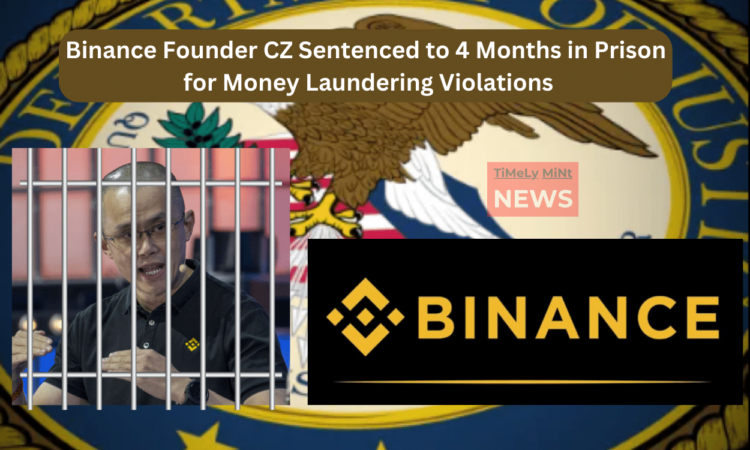Introduction
Changpeng Zhao, the founder of Binance, the world’s leading cryptocurrency exchange, has been sentenced to four months in prison for violating anti-money laundering rules. The sentencing, which took place on Tuesday, April 30, 2024, in a US federal court in Seattle, marks a significant moment in the cryptocurrency industry’s ongoing struggle with regulatory compliance.
Background of Binance
Binance, founded by Zhao in 2017, quickly rose to prominence, becoming the largest cryptocurrency exchange by trading volume within just six months of its launch. Under Zhao’s leadership, Binance grew into a multibillion-dollar enterprise, with a global presence and a diverse range of cryptocurrency offerings.
| Year | Trading Volume (USD) | Market Share |
|---|---|---|
| 2017 | $7.4 billion | 0.8% |
| 2018 | $870 billion | 27.6% |
| 2019 | $2.8 trillion | 50.2% |
| 2020 | $3.9 trillion | 64.7% |
Source: CoinMarketCap
Zhao, known as “CZ” in the crypto community, became a prominent figure, with his influence extending far beyond Binance’s operations. His personal fortune was estimated to be around $43 billion, making him one of the wealthiest individuals in the world.
Charges and Legal Proceedings
However, Binance’s rapid growth and CZ’s influence came under scrutiny as regulators began to investigate the exchange’s compliance with anti-money laundering (AML) and know-your-customer (KYC) regulations. The US Department of Justice (DOJ) indicted Binance and Zhao in November 2023, following a two-year investigation that intensified after the collapse of several high-profile crypto companies, including FTX.
The charges against Zhao and Binance included:
- Violating AML rules
- Knowingly disregarding regulations
- Facilitating criminal activities, including terrorist financing and the sale of child sexual abuse materials
- Receiving a significant portion of ransomware proceeds
In a plea deal reached in November 2023, Zhao admitted guilt, agreed to step down as Binance’s CEO, and paid a $50 million fine. Binance also agreed to pay a $4.3 billion penalty to resolve the charges.
The Sentencing
During the sentencing hearing, US District Judge Richard Jones acknowledged the mitigating factors presented by Zhao’s defense team, including his dedication to Binance and the low likelihood of reoffending. However, the judge expressed concern over Zhao’s “better to ask forgiveness than permission” approach to regulatory compliance.
In a letter to the judge, Zhao expressed deep remorse for his actions and the choices that led to the criminal charges. He assured the court that such incidents would not occur again.
Despite the defense’s request for probation, Judge Jones sentenced Zhao to four months in prison, a term significantly shorter than the three years sought by prosecutors, but more than the probation requested by Zhao’s lawyers.
Implications for Zhao and Binance
The sentencing marks a significant fall from grace for Zhao, who once sat atop the cryptocurrency industry. As part of the plea deal, Zhao has already stepped down as Binance’s CEO and will now serve his prison sentence, likely at a detention center near Seattle-Tacoma International Airport.
Binance, under new leadership, has begun to refashion itself as a more traditional financial firm, appointing a board of directors and working to establish an official global headquarters. The company has also increased its compliance budget and is preparing for the appointment of federal monitors from the DOJ and Treasury Department.
Broader Industry Impact
Zhao’s sentencing sends a strong message to the cryptocurrency industry about the importance of regulatory compliance. The case sets a legal precedent and may pave the way for future regulatory actions against non-compliant cryptocurrency businesses.
The crypto community has had mixed reactions to the sentencing, with some praising the decision as a necessary step towards legitimizing the industry, while others have criticized it as a “miscarriage of justice,” arguing that the punishment does not fit the crime.
Comparison with Other Cases
Zhao’s case bears some similarities to that of Sam Bankman-Fried, the founder of the now-bankrupt FTX exchange, who was sentenced to 25 years in prison in March 2024. However, there are notable differences between the two cases:
- Bankman-Fried was charged with fraud, while Zhao’s charges were primarily related to AML violations.
- Bankman-Fried’s sentence was significantly longer than Zhao’s, reflecting the severity of the charges against him.
- Unlike Bankman-Fried, Zhao and Binance reached a settlement with prosecutors, which likely contributed to the shorter sentence.
Conclusion
The sentencing of Changpeng Zhao marks a significant moment in the cryptocurrency industry’s ongoing struggle with regulatory compliance. As one of the most prominent figures in the space, Zhao’s fall from grace serves as a cautionary tale for other cryptocurrency businesses and highlights the need for strict adherence to legal and ethical standards.
As the industry continues to evolve, it is likely that we will see further regulatory actions and legal cases involving cryptocurrency exchanges and their leaders. The outcome of these cases will shape the future of the industry and determine the extent to which cryptocurrencies can be integrated into the mainstream financial system.
For more information on the Binance case and its implications for the cryptocurrency industry, also visit:














